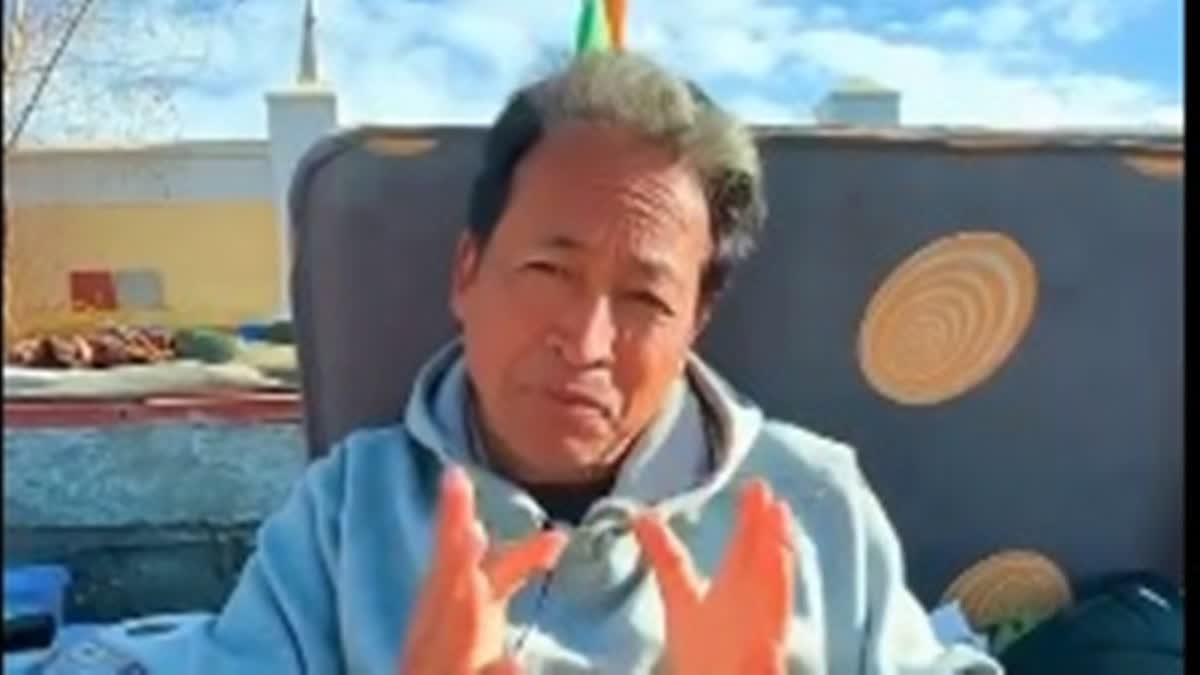New Delhi: Climate activist Sonam Wangchuk requested Prime Minister Narendra Modi on Monday to include Ladakh in the Sixth Schedule of the Constitution, granting law-making powers to local people to protect their land and cultural identity. On September 1, Wangchuk and around 75 volunteers embarked on a foot march from Leh to New Delhi to request the Centre to resume dialogue with Ladakh's leadership regarding their demands.
At a virtual press conference, Wangchuk said he has not received a response to the memorandum of demands submitted to the prime minister during the latter's visit to Dras for the 25th anniversary of Kargil Vijay Diwas in July. Wangchuk also said the creation of five additional districts in Ladakh could be "indirectly linked" to their protest.
"However, we still do not know if these districts have been granted decision-making powers," he said, adding that it would be unfortunate if that is not the case. "Ladakh is an ecologically-fragile region facing industrial and climate-related challenges. I urge the prime minister to fulfil the promise to include it in the Sixth Schedule of the Constitution, which gives autonomy to the local indigenous people to manage this fragile area," Wangchuk said.
"These are the people who have been stewards of this place for thousands of years. Right now, they are facing all kinds of environmental challenges. Industries and corporations are worsening the climate impacts," he said. Wangchuk said through the march, he aimed at drawing the attention of world leaders and the global community to the severe impacts of climate change in the region.
"If the glaciers in the higher Himalayas melt fast, we will suffer first but soon, all of north India, south China and Tibet will face massive floods and droughts. Therefore, this (march) draws urgent attention from people and the government to act in time," he said. Responding to a question from PTI, Wangchuk said the Ladakh Autonomous Hill Development Councils (LAHDCs) of Leh and Kargil have only been granted authority to spend development funds. "The people of Ladakh want law-making powers too," he added.
Wangchuk acknowledged that a single march would not resolve the issue. "We want the Centre to resume discussions on the demands of the Ladakhi people," he said. Wangchuk said he has no intention of joining politics and that the march is unrelated to the upcoming Assembly elections in some states.
In fact, "we are considering avoiding Haryana, which is about to hold elections", he said. Wangchuk claimed that the government has withdrawn its promise to provide tribal area status and full statehood to Ladakh under pressure from "industrialists, who want to exploit the resources" of the ecologically-fragile region.
The noted engineer had earlier told PTI that land in Ladakh is being allocated for solar-power projects, without the consent of the LAHDCs. With around 320 clear sunny days a year and an average daily global solar radiation of 2,022 kWh/m sq./annum, Ladakh is a solar-power generation hotspot in the country. The cold desert also has the potential to generate 35 GW from solar energy and 100 GW from wind energy.
The government has already approved a 13-GW renewable-energy project, with a 7.5-GW solar park, in Ladakh. Wangchuk went on a 21-day fast in March, surviving only on salt and water, to demand statehood for Ladakh and its inclusion under the Constitution's Sixth Schedule to help protect the region from "greedy" industries.
After the provisions of Article 370 of the Constitution were abrogated in August 2019, Ladakh became a Union Territory "without legislature". The Buddhist-dominated Leh district had long demanded Union Territory status due to the alleged neglect by the erstwhile Jammu and Kashmir government. However, with the region now entirely administered by bureaucrats, many in Ladakh demand that the Union Territory be included in the Sixth Schedule, which provides for the formation of autonomous district councils (ADCs) with legislative, judicial and administrative autonomy within a state.
These councils administer areas under their jurisdiction, framing laws on specific matters with the governor's assent. They can establish village councils or courts for dispute resolution and manage facilities and services within their areas, including those related to education and healthcare. They also have the authority to impose taxes and regulate certain activities.
Wangchuk had previously said statehood and constitutional protection under the Sixth Schedule would not impact defence and national security-related projects in Ladakh. Ladakh's former MP, Jamyang Tsering Namgyal of the ruling Bharatiya Janata Party (BJP), had also demanded that the region be included in the Sixth Schedule to safeguard the land, employment and cultural identity of the local population.
In 2019, Union Tribal Affairs Minister Arjun Munda promised to do "whatever is required from a constitutional perspective to protect them". In September 2019, the National Commission for Scheduled Tribes wrote to Home Minister Amit Shah and Munda, recommending that Ladakh be declared a tribal area under the Sixth Schedule.



